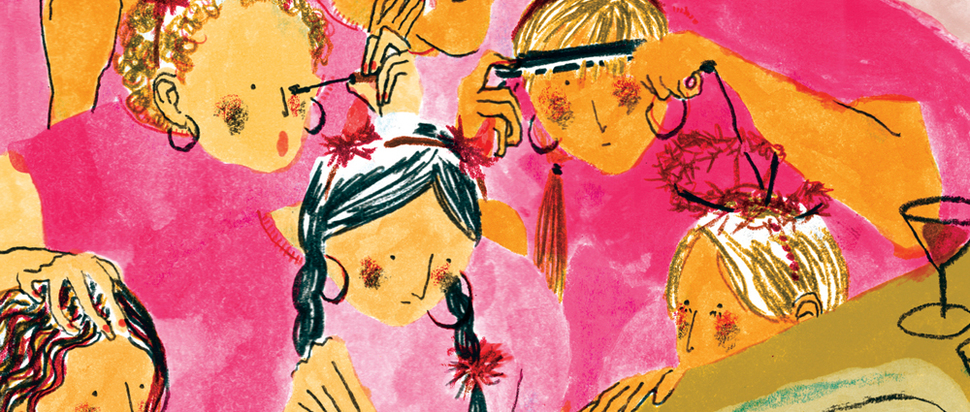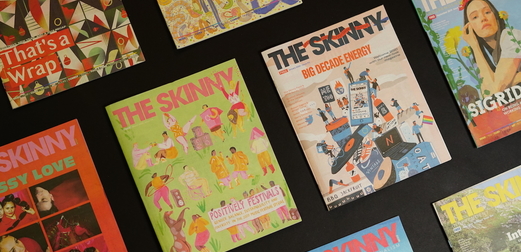The LGBTQ+ club nights thriving in lockdown
With dancefloors placed out of bounds by coronavirus, a look at some of the LGBTQ+ club nights bringing queer communities together by the light of the computer screen
Like many of our colleagues and friends in Scotland's creative community, The Skinny have been hit hard by the coronavirus pandemic, so we're asking for your support to help bring back the magazine after lockdown. Donate to our crowdfunder here – any support you can offer is hugely appreciated!
As Covid's first wave washes over the country, pubs have been deified as pillars of British society, and parks have become essential for reuniting with friends and family. Yet other spaces in society that were once second nature to us have been abandoned by the government, reliant on crowdfunders or donations to pay crippling rents.
This 'new normal' could not feel more bizarre and bewildering, particularly in the way in which spaces doubling as community centres for the LGBTQ+ community have had to close their doors for the foreseeable future. Yet, having long existed on the fringes of mainstream social life, the queer community is adept at carving out its own spaces to celebrate and spotlight those still overlooked on account of their gender, race and sexuality. Lockdown has proved no different, with many collectives and DJs resurrecting spaces for womxn, non-binary and LGBTQ+ people online – glitching screens be damned.
Quarantine Queens
Quarantine Queens is one such virtual club night leading the way. It first appeared in March, intent on helping viewers ‘find your inner quarantine queen by tuning into the best mixes from your fave femme, womxn and nb artists’. Ellie, QC's founder and resident DJ known on the decks and in drag as Sir Traline, tells us: “I saw an article one day that people in Wuhan had started virtual parties and I thought – why not? Dancing and music has always been a lifesaver for me and as lockdown dragged on it became the highlight of my week.”
As the flags, glitter and waistcoats of spotlighted partygoers flitted across my screen when I first tuned in, the loneliness and anger I’d felt at a world so suddenly changed faded away. Seeing many faces after weeks of staring at walls and out into empty streets was the reminder I needed that I wasn’t alone.
Flatmates and friends from across the world dance, chat and even try to recreate *that lift* from Dirty Dancing between performances from drag dynamos like Mystika Glamoor, Orlando and Prinx Silver. “It's been lovely to see people find a space they feel comfortable in and come back week after week” says Ellie, adding that the loss of “the element of intimacy” and “physical connection” in virtual nights is in part absolved by the opportunity to chat while partying, with many “making good friends from all over the country, which is not something you can do as much in a physical space.”
Quarantine Queens has delivered DJ sets from the likes of Miss World, Queer House Party and Charlie Nord, helping keep our spirits high and bodies moving as the world outside ground to a halt.
Queer House Party and Grrrl Crush
When our reliance on web 2.0 increased during lockdown, so too did the pressures of being constantly online – amplified by increased attacks on marginalised communities. Queer House Party, based in London and created as an virtual alternative to nights held by anti-fascist queer DJ collective Glamtifa, was targeted by trolls in late March. In response to similar and widespread acts of zoombombing and trolling, Zoom implemented security measures to better protect its streams, which had come to be relied upon by families, friends and communities to stay connected. Quarantine Queens created a code of conduct and policies on hate speech to mitigate these dangers, but various risks in hosting virtual, accessible and inclusive parties for marginalised folks remain.
“It's difficult because it was something that I didn't really know how to control” says Roberta, DJ and part of Grrrl Crush, on hosting the first of their Basement Ravestations. “Usually you would have a way to control [the space] – somebody explaining to somebody what your night is like,” Roberta explains. “You’d have the bouncers or an exchange on the door to be like, ‘this night is like this…’. We have always had this Safe Space Policy, you know, where if you get hassled you can come and talk to us”. Inclusive spaces and clubs depend on clear policies, communication and protection to safeguard those present. Moving safe spaces online, however, means embodying all the roles required for this at once – simultaneously playing DJ, host, bouncer and moderator.
All this, plus the fact that, as Roberta points out, “it’s quite a brave move to put yourself online as an LGBTQ+ person”. The backdrop of rising misogyny, homophobia and transphobia online means “you're kind of opening yourself up to trolls and horrible people.” Indeed, social media is awash with the language historically used to typify a conservative moral panic around LGBTQ+ visibility and rights.
For Roberta, this just makes queer visibility even more important: “I think a lot of people are feeling really, really isolated. People need that support of knowing that there are still people they can connect with and that their community is still there even though they're stuck in their homes”. The decision to start Basement Ravestation, and transform her bedroom into “a sort of rave cave”, came after seeing how other LGBTQ+ club collectives responded to lockdown. Shoot Your Shot is one we both momentarily gush over when I speak to her, as Roberta notes the solace which comes with “feeling like your people are putting on a thing for you”.
'Online LGBTQ+ spaces are a testament to solidarity and creativity'
Shoot Your Shot is practically a household name in Scotland’s queer nightlife scene, with its extravaganzas sparking joy across and beyond the central belt, in venues like The Poetry Club in Glasgow and Paradise Palms in Edinburgh. You can always count on a dazzling diversity of dancers, DJs and drag acts at their nights and now online too. Roberta had previously pointed out an issue with hosting online club nights that hadn’t occurred to me: with no one to dance with, kiss, or become best pals with in the bathroom, how the hell do you keep attendees engaged?
Despite our dwindling attention spans, it’s difficult to get distracted when tuning in to Shoot Your Shot. Their Sunday Service streams showcase performers pushing the boundaries of queerness, celebrating it in all its inbetweenness and variety. The team responsible also take the time to platform those looking to promote their own talent, moves or message – mirroring Ellie’s efforts at Quarantine Queens to platform the wider community, particularly “performers and guest DJs [who] are representative of the community and not just white and cis.”
Swapping out the sexy, sweaty, swirling haze of our favourite club nights for streams beset by struggling bandwidth may seem like a small sacrifice in the grand scheme of things. But LGBTQ+ clubs, bars and inclusive nights for womxn, non-binary and gender non-conforming folks have always existed out of necessity. Those stepping up to meet the challenges of hosting these spaces online – pioneering pride and protest against the grain of growing prejudice and in the most unpredictable, unprecedented of times – are a testament to the strength of our solidarity, creativity and perseverance.

